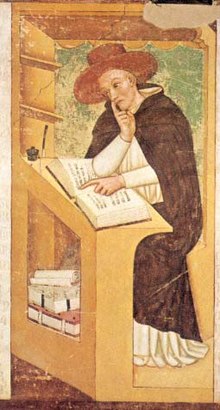Robert Kilwardby
|
His Eminence Robert Kilwardby OP |
|
|---|---|
| Cardinal, Archbishop of Canterbury Primate of All England |
|
 |
|
| Appointed | 11 October 1272 |
| Term ended | 5 June 1278 |
| Predecessor | William Chillenden |
| Successor | Robert Burnell |
| Other posts | Cardinal Bishop of Porto and Santa Rufina |
| Orders | |
| Consecration | 26 February 1273 by William of Bitton (II.) |
| Created Cardinal | 12 March 1278 |
| Rank | Cardinal bishop |
| Personal details | |
| Born | c. 1215 |
| Died | 11 September 1279 Viterbo |
| Buried | Dominican convent, Viterbo |
| Education | University of Paris |
Robert Kilwardby OP (c. 1215 – 11 September 1279) was an Archbishop of Canterbury in England and a cardinal. Kilwardby was the first member of a mendicant order to attain a high ecclesiastical office in the English Church.
Kilwardby studied at the University of Paris, then was a teacher of grammar and logic there. He then joined the Dominican Order and studied theology, and became regent at Oxford University before 1261, probably by 1245. He was named provincial prior of the Dominicans for England in 1261, and in October 1272 Pope Gregory X appointed him as Archbishop of Canterbury to end a dispute over the election. Kilwardby was provided to the archbishopric on 11 October 1272, given the temporalities on 12 December 1272, and consecrated on 26 February 1273.
Kilwardby crowned Edward I and his wife Eleanor as king and queen of England in August 1274, but otherwise took little part in politics. He instead concentrated on his ecclesiastical duties, including charity to the poor and donating to the Dominicans.
In 1278 Pope Nicholas III named Kilwardby Cardinal Bishop of Porto and Santa Rufina. He then resigned Canterbury and left England, taking with him papers, registers and documents belonging to the see. He also left the see deep in debt again, after his predecessor had cleared the debt. He died in Italy in 1279 and was buried in the Dominican convent in Viterbo, Italy. While in theory this was a promotion, probably it was not, as the pope was unhappy with Kilwardby's support of efforts to resist the payment of papal revenues and with the lack of effort towards the reforms demanded at the Second Council of Lyon in 1274.
...
Wikipedia
